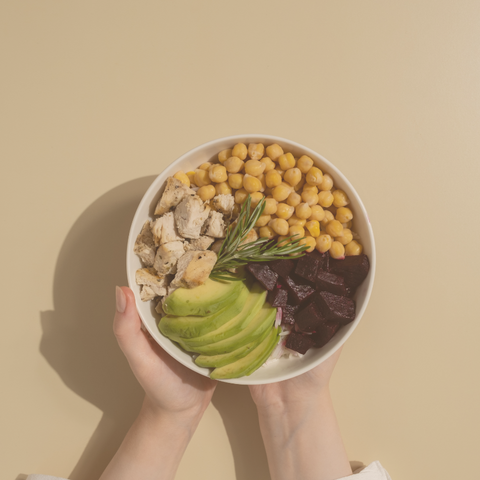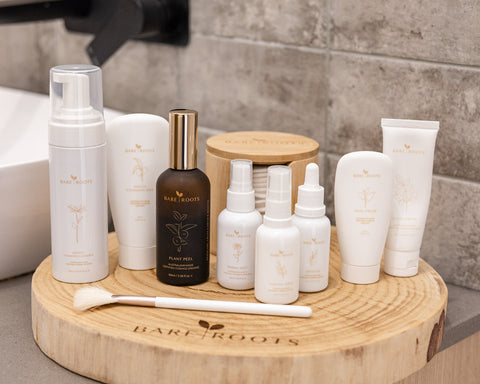We’ve been seeing a lot of chatter recently about the effects of your diet and how this impacts your skin. It brings back the old saying “you are what you eat” - but is this really true when it comes to optimising the health of your skin?
Now don’t get us wrong, diet absolutely plays a role in how your skin will function on a day to day basis, but does this mean that all skin conditions can be cured just by a change in what you eat? The short answer, we feel, is no.
Before you go grabbing some nuggies at the McDonalds drive through on your way home and telling everyone Bare Roots said it was alright, let’s actually dive into some science of what nutrients our skin requires to function - we promise to keep it simple!
The Skin Cell Nutrient Communication
Our skin cells are constantly undergoing communication with each other, sharing information and nutrients between them to function optimally. Skin cells require specific vitamins, minerals and nutrients in order to have a sense of ease when it comes to producing key structures such as collagen, elastin and Hyaluronic Acid.
Key Nutrients for Optimal Skin Health
Vitamin C
Vitamin C is a powerful antioxidant that protects the skin from free radical damage caused by UV rays and pollution. It's also essential for collagen production, a protein that keeps the skin firm and youthful. Foods rich in vitamin C include citrus fruits, strawberries, capsicums, and broccoli. Complementing your diet with Bare Roots Gentle Cleansing Milk, which is rich in natural antioxidants, can enhance your skin’s resilience and complexion.
Omega-3 Fatty Acids
Omega-3 fatty acids, found in fatty fish like salmon, walnuts, and flaxseeds, help maintain the skin's lipid barrier, which locks in moisture and keeps the skin hydrated. They also reduce inflammation, which can assist in reducing redness, acne, and other skin conditions. To further support your skin's hydration, consider Bare Roots Omega Oil, a blend of nourishing oils designed to protect and encourage a healthy balance of oil production.
Vitamin E
Like vitamin C, vitamin E is an antioxidant that protects the skin from oxidative stress. It also plays a role in skin repair and regeneration. Nuts, seeds, and leafy green vegetables are excellent sources of vitamin E. Bare Roots products, such as our Curative Serum, are formulated with natural ingredients rich in vitamin E such as Shea Butter and Carrot Seed Oil to offer improvements in skin texture.
Zinc
Zinc is essential for skin cell production and repair. It also helps regulate oil production, making it particularly beneficial for those with acne-prone skin. Foods rich in zinc include oysters, pumpkin seeds, and lentils. To enhance your skin’s healing process, incorporate Bare Roots Vital Cream for a boost in topical Zinc that can help reduce inflammation associated with Acne, Rosacea, Eczema and more.
Vitamin A
Vitamin A supports cell turnover, helping to keep the skin smooth and free from dead skin cells that can clog pores. It also plays a role in the production of collagen. You can find vitamin A in foods like sweet potatoes, carrots, and leafy greens. For a topical application, you can find natural Vitamin A derivatives within Bare Roots Bamboo Enzyme Peel with ingredients like Pumpkin Enzymes. The beta-carotene can assist in naturally exfoliating the skin to reduce skin congestion and enhance brightness.
Skin Conditions That May Appear, Regardless of Your Diet
Acne
Acne is often associated with a poor diet, but it can affect anyone, even those with a pristine diet. Hormonal imbalances, genetics, stress, and skincare habits play significant roles in the development of acne. These factors can cause overproduction of sebum, leading to clogged pores and inflammation, regardless of how clean your diet is.
Eczema (Atopic Dermatitis)
Eczema is a chronic condition that causes the skin to become red, itchy, and inflamed. While certain foods might trigger eczema flare-ups in some people, the condition is often linked to genetic factors, environmental triggers, and immune system responses. Even with a nutrient-rich diet, managing eczema may require avoiding specific allergens and irritants.
Seborrheic Dermatitis
Seborrheic dermatitis is a common skin condition that causes scaly patches, red skin, and stubborn dandruff. It primarily affects oily areas of the body, such as the scalp, face, and chest. While diet can influence skin health, seborrheic dermatitis is more often linked to an overgrowth of yeast on the skin and can be influenced by stress, weather changes, and hormonal fluctuations.
Rosacea
Rosacea is a chronic skin condition that causes redness, visible blood vessels, and sometimes small, red, pus-filled bumps on the face. While certain foods and drinks can exacerbate rosacea, the condition is largely influenced by genetic factors, environmental triggers, and possibly, gut health. Maintaining a healthy diet might help manage symptoms but as Rosacea is incurable, it won’t necessarily prevent the condition from being present.
Dehydrated/Dry Skin
Environmental factors like cold weather, low humidity, and excessive indoor heating can strip the skin of its natural moisture. Ageing also plays a role, as the skin produces less oil over time. Additionally, harsh or incorrectly prescribed skincare routines, underlying health conditions, and certain medications can lead to dry skin despite good dietary habits. While diet and hydration are important, managing dry skin often requires addressing these external factors and adopting a gentler skincare regimen. Even better, purchasing skincare from a trusted source, rather than from what’s trending can make all the difference to preventing unnecessary flares.
What Can Be Done To Optimise Skin Health
Whilst diet may not cure these conditions alone, it’s still important to ensure you are eating a well balanced diet full of the key nutrients that we mentioned earlier, along with finding an Australian made skincare brand that is certified organic to assist you topically. Here’s our lifestyle implementation roundup for optimal skin health:
Stay Hydrated
Drinking enough water is vital for skin health. Hydration helps maintain skin elasticity, flush out toxins, and keep the skin plump. Aim for at least 8 glasses of water a day to support your skin's natural glow.
Get Enough Sleep
Quality sleep is crucial for skin repair and regeneration. During deep sleep, your body increases blood flow to the skin, leading to a healthier complexion. Aim for 7-9 hours of sleep per night to give your skin the time it needs to recover.
Practice Sun Protection
Protecting your skin from UV damage is one of the most important things you can do for your skin's health. Use a broad-spectrum sunscreen with at least SPF 30 daily, even on cloudy days. This helps prevent premature ageing, sunburn, and reduces the risk of skin cancer.
Use Good Quality Skincare
Not all skincare is the same, especially when it comes to claims of being “natural” or “organic”. Bare Roots is proud to be COSMOS Certified Organic and founded by an Australian Dermal Therapist & Cosmetic Chemist. This means that not only is the range developed by a hands on skin therapist who treats real skin, but it’s also heavily regulated and contains a minimum of 95% certified organic ingredients and 100% natural ingredients. Bare Roots was created with skin health in mind, to help enhance your daily routine and instil confidence back in to your skin.




